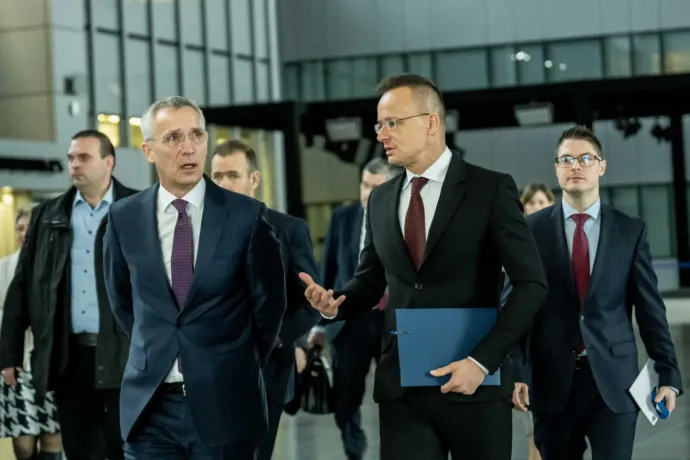
Hungarian Minister of Foreign Affairs and Foreign Trade, Péter Szijjártó visited Brussels on Tuesday. He gave a detailed account of his meetings and the "enormous pressure" on Hungary's minority protection priorities and gas imports to the Hungarian State News Agency, MTI. According to Péter Szijjártó
"there is enormous pressure on the Hungarian government from both sides of the Atlantic to give up the protection of the Hungarian community in Transcarpathia, but this will not happen under any circumstances".
The minister was referring to the Hungarian government's consistent blocking of the convening of the NATO-Ukraine Commission for years. In November, it even prevented the Ukrainian foreign minister from attending the full official session of the two-day NATO foreign ministers' meeting. Szijjártó justified this effort by saying that "we see NATO as a community of those with shared values (...) Therefore, we consider it important that only countries that respect the rights of national minorities should be allowed to move closer to NATO."
Since you're here, we'd like to ask you to be a part of shaping Telex English!Take a few minutes to fill out our anonymous survey, and tell us what you think about Telex English and how it could be even better!
However, "the rights of national communities, including the Hungarian national minority, have been practically continuously curtailed" in Ukraine since 2015. The Hungarian government has indeed been demanding for years that the incumbent Ukrainian leadership withdraw the education law that abolishes public education being conducted solely in the Hungarian language (for members of the Hungarian minority – TN).
On Tuesday, Szijjártó met with Jens Stoltenberg, and according to the minister, the NATO Secretary General, although he "understood the issue", said that
"for various reasons, which are not for me to go into, he will convene a ministerial-level meeting of the NATO-Ukraine Committee during the Foreign Ministers' Council on 4 April, despite the Hungarian opposition, despite the fact that we believe such a meeting could only be convened if there is unanimous agreement".
According to Szijjártó, although the decision taken despite Hungary's opposition "violates the unity of NATO and the procedures for a unified will, nonetheless we cannot do anything other than take note of the Secretary General's decision". It is not yet clear on what grounds NATO can negate the Hungarian veto which has been taken into account in the past.
Hungary's dissenting opinion is now routinely bypassed in EU resolutions
As we reported on Monday, European Union member states also ignored the Hungarian government's opposition to the International Criminal Court's (ICC) arrest warrant for Vladimir Putin. Despite Hungary not joining either the European Council or the EU justice ministers' joint resolution in support of the move, EU officials presented it to the public as a "united European position".
Similarly, the Hungarian government took a position of "constructive abstention" in the decision on the EU's €2 billion ammunition purchase fund for Ukraine, and could only abstain from contributing to the fund – at least in name, through a creative accounting procedure, as 444.hu points out: Hungary can allocate the two million euros it has to pay for peace missions in the Balkans or for the costs of border guards deployed to control migrants, and through this method the funds are booked for the purchase of ammunition.
For more quick, accurate and impartial news from and about Hungary, subscribe to the Telex English newsletter!